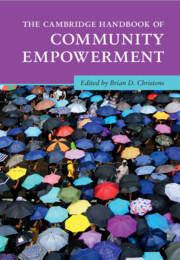Book contents
- The Cambridge Handbook of Community Empowerment
- Cambridge Handbooks in Psychology
- The Cambridge Handbook of Community Empowerment
- Copyright page
- Contents
- Figures
- Tables
- Contributors
- Building Community Power
- Part I Organizing and Activism
- Part II Participatory Governance
- Part III Civil Society and Coalitions
- Part IV Enterprise
- Part V Participatory and Community Arts
- Part VI Education and Engaged Research
- 20 Action Civics
- 21 Gender–Sexuality Alliances
- 22 Youth Participatory Action Research in School Settings
- 23 Community-Based Education
- 24 Community-Engaged Research
- Concluding Thoughts on Building Community Power
- Contributor Details
- Index
- References
24 - Community-Engaged Research
from Part VI - Education and Engaged Research
Published online by Cambridge University Press: 18 April 2024
- The Cambridge Handbook of Community Empowerment
- Cambridge Handbooks in Psychology
- The Cambridge Handbook of Community Empowerment
- Copyright page
- Contents
- Figures
- Tables
- Contributors
- Building Community Power
- Part I Organizing and Activism
- Part II Participatory Governance
- Part III Civil Society and Coalitions
- Part IV Enterprise
- Part V Participatory and Community Arts
- Part VI Education and Engaged Research
- 20 Action Civics
- 21 Gender–Sexuality Alliances
- 22 Youth Participatory Action Research in School Settings
- 23 Community-Based Education
- 24 Community-Engaged Research
- Concluding Thoughts on Building Community Power
- Contributor Details
- Index
- References
Summary
Community-engaged research (CEnR) has moved from the fringes to the mainstream of academic research, particularly that which orients to goals of social, racial, and health equity. The construct of empowerment, which encompasses interconnected processes at the level of the individual, the organization, and the community, can be used to understand the mechanisms by which CEnR may contribute to improvements in equity and justice. This chapter introduces and describes a conceptual model for empowerment in CEnR that synthesizes ideas and empirical advances from community psychology and public health. We use the model to examine the processes by which social power can be built and exercised through CEnR at multiple levels of analysis, suggesting that the power that comes from community-led and grassroots community organizing processes has the greatest significance for equity-based CEnR and ultimately for goals of equity- and justice-focused social change.
Keywords
- Type
- Chapter
- Information
- The Cambridge Handbook of Community Empowerment , pp. 606 - 631Publisher: Cambridge University PressPrint publication year: 2024



